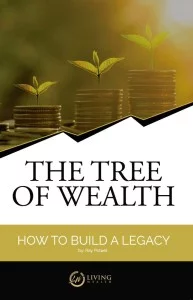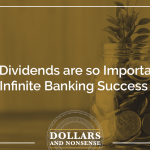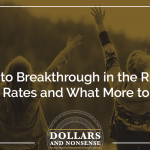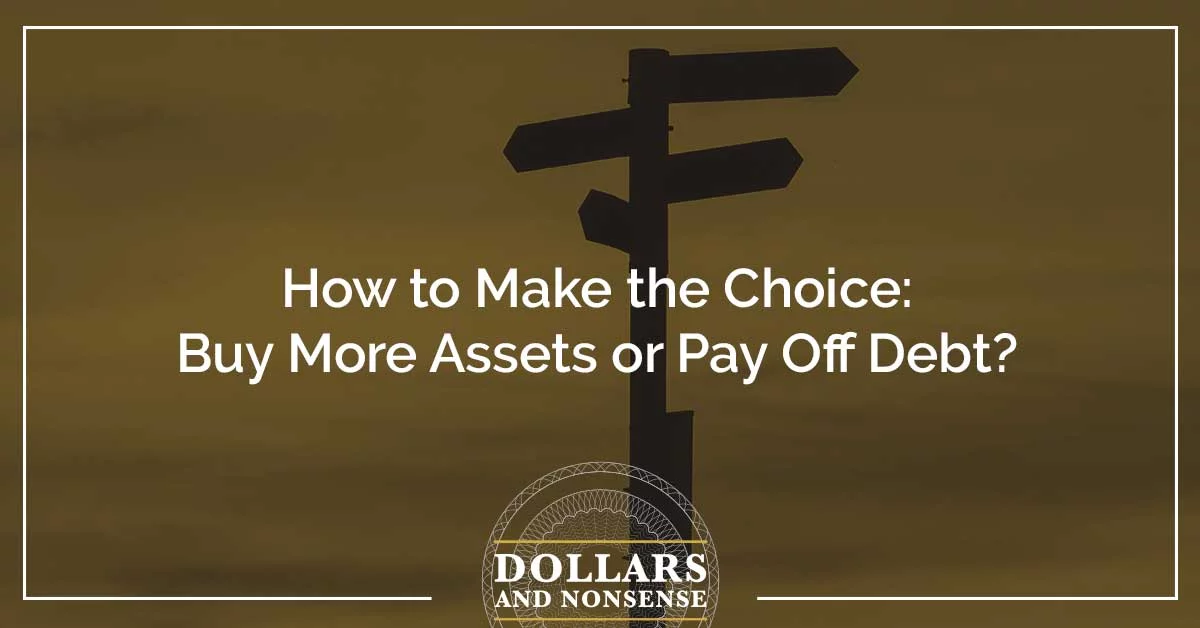In this episode, we discuss a question we’re often asked when it comes to banks vs. insurance. The question is, are mutual life insurance companies as safe as banks to put my money? The answer may surprise you.
Banks vs. insurance, which is safer is a great question to ask, in fact. People want to know their money won’t disappear on them.
And the common question we get related to infinite banking is this: “Is my money going to be as safe in the policy as it is, just sitting in a bank account. There’s a lot of nuances there.
We believe that it is. And there’s a lot of reasons for it. So we posit banks are riskier to put your money in, than a mutual life insurance company.
Banks vs. Insurance Topics Discussed:
- The federal government and state government’s role
- Austrian economics and why its role in insurance is important
- Leveraged money vs. Non-leveraged money
- Factors forcing insurance companies to play it straight with your money
- The myth and nuance of the FDIC banks protections argument
- Why banks buy life insurance policies
Want Financial Freedom?

Start your journey to financial freedom with this first step.
Get our 122 page eBook The Tree of Wealth here now.
Episode Takeaways:
Podcast transcript for episode 25: Banks vs. Insurance
Nate: In this episode, Holy and I will discuss a question that we’ve both been asked many times. The question is, are mutual life insurance companies as safe as banks to put my money? The answer may surprise you. She’s Holy. She helps people find financial freedom.
Holly: He’s Nate. He makes sense out of money. This is Dollars and Nonsense. If you follow the herd, you will be slaughtered.
Nate: All right Holy. So, this is something that we’ve been asked many times. It’s a great question to ask. People are wanting to know, make sure their money is safe, it won’t just disappear on ’em, which is a good thing. And so, the common question we get is, you know, for this infinite banking concept, becoming your own banker … People kind of ask, “Well, is my money going to be as safe in the policy as it is, just sitting in a bank account. There’s a lot of nuances there. You know, we’ll get into, hopefully a few things. I certainly believe that it definitely is. There’s a lot of reasons for it. Why would we, maybe present banks, maybe even being more risky to put your money in, than a mutual life insurance company, and a policy there?
Holly: Well, I think there can be several reasons, why I, personally believe there safer, but I think research will show you that a life insurance company is safer as well. I would tell you, don’t just take Nate and I’s word for it. Go out and do your own research on it.
The bottom line is, is that life insurance companies actually aren’t mandated by the federal government. They’re mandated according to each state. And so, there are stricter guidelines placed on them, but the biggest significant thing is that, insurance companies actually adhere to what’s called Austrian Economics. They can’t loan out money they don’t have, which banks actually can do, and they’re mutual companies as well, so … For me, they don’t take as much risk in the investment side, in order to yield the rate of return that a bank might take.
Nate: The Austrian economics … For those of you don’t know … You know, we live in a [inaudible 00:02:19] school of thought, for the most part, where the big central banks are big players in the money game. Pretty much, with the Austrian Economics, it brings it back to just a simple world, where a dollar is a dollar.
Banks are the only institutions in the world that get to pretend they have money that doesn’t exist. They lend out money that’s not there, and they think that, that’s a great idea and that should be allowed, but nobody else can make a loan with pretend money. Insurance companies are that way. Whereas a bank many have 10 dollars on loan for every one dollar in deposit, and insurance companies deal a dollar for a dollar.
First off, just by the nature, they both make loans. That’s their main business model. One is extremely leveraged. One is not leveraged at all. That is a huge, you know, benefit to us as policy owners. Why, insurance companies are very safe. And then also, Holy, as you mentioned, insurance companies, especially mutual companies …
Holly:Yes.
Nate: So, there’s mutual companies, and there’s stock companies in the insurance world. Stock companies … You can buy stocks in ’em. You do not obtain ownership, when you buy a policy. You obtain ownership when you buy stock. Those stock companies … Their goal is to profit their stockholders, so they’re focused on quarterly earnings to make sure the stock prices go up, and things like that, which means they’re taking quite a bit more risk, than a mutual company would be.
In a mutual company, they know that there are no stockholders that could bite the bullet if something does happen. They say, we’ve got to be very conservative with what we do. That’s why you very rarely see decent large mutual life insurance company fail. I mean, I can’t even think of really, any in the recent years, that have failed a decent lot … Even through the financial crisis and since, in the modern economic era. None of them even phase. In fact, I think all of the insurance companies we write with, actually have increased dividends …
Holly: They have.
Nate: since the financial crisis, and during the crisis. It was like … We didn’t have a financial crisis …
Holly: No.
Nate: in the insurance world. Now, banks failed left and right, and had to get bailed out, all over the place. No mutual life insurance company had to, you know, get any assistance. Banks fail on a much higher pace than mutual life insurance companies do. There’s reasons for that, as we’ve already mentioned. Even on top of that, I would say, as far as insurance companies go … There’s a reason that their safer, and you can be confident in it, because the companies we use that pay dividends every year for about 150 years, 130, 150 years, been profitable every single year. I’m okay with buying into a company that’s doing that. They’ve weathered the storm.
Holly: I’m okay even with the fact that, like, where Nate’s saying, “Hey. They’ve paid dividends.” That is what you’re guaranteed right? That you get, and anything above and beyond that as well, because … What they’re doing is making sure that they’re taken care of the policy holders.
Those that own life insurance policies with this mutual company, and they are not focused on that quarterly return. And so, they can’t even take your dollar, if they don’t have a dollar to match it, to where the bank can keep taking your money all day long, irregardless if they have the money to back it. They’re just lending. I mean, [crosstalk 00:05:37] over and over again money that doesn’t exist. It’s really funny money. It’s not there. It’s not relevant. And, they can loan it out, to where an insurance company can’t do that. And so they really are practicing … When they loan a dollar out, they have to have that dollar in reserve. Most of ’em actually have more than the dollar.
Nate: I know. The reserves and these interest companies are insane. You won’t believe how much money these insurance companies have, just sitting on reserve. Mutual life insurance companies charge you more than they know they’re going to need, in the first place, to have that wiggle room.
In other words, if an insurance company says, “Okay. This guys gonna buy a policy.” He needs, let’s say it’s a 100,000 dollars of death benefit. Here’s what we think we probably will need to charge them, in order to make that happen, but we’re not just gonna charge ’em … Let’s just use a round number and say it’s a 1,000 dollars for it. We’re gonna charge ’em 1100.00 dollars for it, just to make sure … Assuming that anything that could happen, would happen, we will actually have more than what we need.
That’s how these companies continue to pay dividends every year, is because they’re so profitable, and they’re profitable by design. It really makes sense. I mean, that’s one of the things. They charge more. We’ll get into a few more things, just after this quick break, and a message from our sponsor.
Announcer: Are you tired of being stressed about money? The Dollars and Nonsense Podcast is sponsored by Living Wealth. Visit livingwealth.com/freedom to get your free smart money eBook, and sign it for a personal wealth presentation today. Living Wealth is a family owned and operated business, which works with individuals, families, and even businesses to slay the money stress dragon.
Our clients receive individual coaching, regarding wealth creation, and how to create a retirement income. You’ll be enabled to have cash today, and in the future. Since 1972, Living Wealth has been committed to educating smart people on basic money principles, to assist them in becoming debt free, and finally find financial freedom. Let us help set you free. Remember to visit livingwealth.com/freedom, to receive your free eBook, and even sign up for an individual wealth presentation today.
Nate: If you like the work we do here, be sure to tell others what you think. Leave us a review on iTunes. You can go to livingwealth.com/iTunes, to get to the show quickly.
Holly: Once on iTunes, click on the ratings and review. Then click the button that says, write a review. Just a few nice words, and five star review is all we ask.
Welcome back. We are gonna talk now, about the difference versus FDIC with a bank. A lot of people ask me, “But an insurance company doesn’t have the FDIC.” And really, in reality, we are focused on the fact that we believe our dollars in the bank, are protected, because it’s FDIC. We hear that all the time. Basically, in our mind, we think our money’s guaranteed, that if we deposit it in the bank, because the bank is FDIC, we’re guaranteed to get that money back, should something happen.
In reality, that is actually not true. There is only a small percentage of money in regards to deposits. Think of your money as deposits in the bank. There’s only one or two percent of that deposit normally in the bank that is guaranteed to be returned. And so, because of that, we really are in a false sense of reality that our money’s safe in a bank. I actually, personally believe my money is more safer in a life insurance company, than it is in a bank.
Nate: Yeah, I know. And that’s the thing … I mean, FDIC has like one or two percent of the money they would need to cover all the deposits that are out there. You know, that’s what’s funny is … You know, for so long, FDIC insured 100,000 dollars of deposits. And then, in the financial crisis, they just say … Without having any more money than they did, before the financial crisis, they said, “Let’s go ahead and bump this up to 250,000 dollars.”
Holly: Yep.
Nate: Oh. Okay. I’m glad that you guys can do that, with no more money than you had the day before. It’s like … You know, it’s just like magic money again. It just makes you feel good, and makes you more confident, the populous, but it’s not really based on reality. They have very little of the money they would need, if there was a collapse of the banking system. You know, it’s a very dangerous place, knowing that, but … As well, so the FDIC is in the bank world, federally run. The insurance companies don’t fall under that FDIC, but they do have their own similar organization, I guess you could say. It’s statewide, so insurances run statewide.
The state’s insurance department have what’s called, like a state guarantee association, or something similar, which acts in a similar role to the FDIC, where they will try to insure … Company’s pays into this guarantee association [crosstalk 00:10:40], like a pool of money, that they actually are paying into, to insure, you know, a certain amount, I think … Each states a little bit different, but it’s similar, maybe like 100,000 of cash value, and 200,000 of that … I mean, something like that. Each states a little bit different on what they guarantee, so they … First off, I don’t think a mutual life insurance company’s gonna collapse. We would have to be in an economic crisis that we’ve never seen for it to start happening to the big mutual companies.
Even if they did, there’s the big pool of money in the guarantee association that will help cover that. If you are worried that maybe your insurance company that you’re with might get singled out and fail, by itself, you know, assuming bad management or something like that … You know, very rarely do you just see a big one fail and close their doors. Normally, you’ll find, they merge …
Holly: Yep.
Nate: with another company.
Holly: Yes.
Nate: Or, they just simply get bought by another company. I mean, very rarely when an insurance company fails, do the policies just disappear. I don’t even know if that’s happened, or they just disappear. It’s almost every time, if an insurance company fails, per say, they will get bought, or merge, before they close the doors, cause many times it may just simply be bad management, or lack of resources, or something like that, that a bigger company will swoop in, and knows how to run things. You may see that at times, but that’s about the extent of it.
Holly: And what happens, even when they merge, is that this other, bigger mutual company comes in, and takes over the policy’s and the policy servicing of the company that maybe [crosstalk 00:12:16] and they maintain the guarantees, so … Really, in reality where a bank can go under and your money’s gone … Even if a life insurance company is struggling, you have the stake guarantee account, but you also have other life insurance company’s that are coming in to come in, and basically manage it better, or to take over those policies, in order to provide the service that you were guaranteed originally.
Nate: Right. I mean, history would show that mutual life insurance companies are extremely safe. There’s a difference between mutual, and stock. Always remember that. Stock insurance companies are ran similarly to a bank. Think like, AIG. You know, they were the insurance company that got hit in the financial crisis. It wasn’t their insurance side anyway.
Holly: It was their investments.
Nate: It was their investment and options, and derivatives, that they were going nuts with, like the banks. That’s what got ’em in a ton of trouble. No mutual company could have done what AI did. They’re not allowed to do it, and they would never risk like that. It would be ridiculous. There’s a difference between [inaudible 00:13:16], but mutual companies have a track record that’s just unmatched, in the financial world. You can feel confident in that, plus the fact that if you get a high rated, you know, large reserve company that knows what they’re doing, chances are very high that you’ll do well, but …
One more thing as well, I thought I’d say. This gets us into actual, the banking concept we teach. Infinite banking. If, you’re actually using your money … Some people think that they’re worried that they’ll lose money. Well, my thoughts are, how much money do you just want sitting around anyway?
You know, our goal is to keep money in motion. You are gonna have money in places, but you only can lose money, that you leave somewhere. If, that makes sense. That’s what I’m trying to say. I’ve had people say, “Well, what if they go bankrupt?” Well, I’m saying, “Well, they could, but hopefully you’re doing banking, and you don’t just pay premiums and let your money sit.”
Hopefully, you’ve got money moving elsewhere. You’ve got money paying off debt. You’ve got money in other investments. You’ve got money constantly working, where it’s not just all sitting. It’s like having money sitting in a bank account. That’s the only time you’d be worried, whether or not the bank failed, is that … Not the fact that you have an account there, but just if you have a ton of money sitting there.
Holly: Yeah. Doing nothing.
Nate: Doing no … And so, in the policy, you know, you are earning. That’s great, but you know, what we’re saying, you can only actually lose the money that’s sitting in an account of that nature. If that’s a worry to you, just keep it in motion. Keep moving it. You know, buy yourself a safe, and store some cash. I don’t know, but … There’s always risk in anything you do. An insurance company can go under. It is possible. Be wise about it, and we’re not saying it’s impossible, it’s just unprecedented would be a better word.
Holy: It’s unprecedented, and it’s a lot more banks would fail, before insurance companies would fail, because their loaning money. Like we said, they don’t have. It’s funny money. And even FDIC, they raised it to 250,000 dollars. You should read the fine print of what’s actually guaranteed in your bank, because … Just cause you have 250,000 dollars sitting in a bank, doesn’t mean that they’re gonna give you 250,000 dollars, if the bank goes under.
Nate: Right.
Holly: They don’t really have that money. We’re believing in something that doesn’t really exist, just like the funny money. We’re believing the FDIC is gonna come through for us. In reality, they don’t have the money to cover the deposits anyways. Are we just gonna print money that’s worthless? Possibly.
Nate: It is possible. We’re that crazy, but … And that’s the thing though, when I was talking about unprecedented, is that, it would have to be a financial crisis, so severe, greater than the depression, greater than anything we’ve seen to cause some of these mutual life insurance companies to start failing. And that’s the thing though, you will see the signs on the wall, far before it. Unlike a bank, who can just shut its doors …
You know, it’s gonna take a lot to hit these huge mutual life insurance companies with the reserves that they have, their ability to buy time. It’s one of the safest places, one of the last places in the financial world, that does not jump into derivatives, and options, and things like that, at a high level that you see banks doing. A dollar’s still a dollar. They’re very low in leverage. They’ve got just tons of money, sitting around, waiting for a catastrophe, so that they can prove to the world, how safe they are.
Holly: And they have to be safe, because banks are buying these policies.
Nate: Yeah.
Holly: They’re buying into these life insurance policies, and giving money to these companies. If banks didn’t believe their money was safe there, they wouldn’t be purchasing [crosstalk 00:16:52] the product.
Nate: Even, the safe banks are buying policies, because of the safety and the stats of these new life insurance companies. Maybe it’s not a bad idea for you to own some. If it’s safer than their own accounts, it’s probably safe enough for us, you know. Any last words Holy, before we …
Holly: I think, just, I’m gonna challenge you. Do the research, but I, in my viewpoint and opinion, I think a life insurance company is actually safer than a bank. Like Nate said, you wanna keep your money in motion, and you wanna keep it moving. The only money you can lose, is the money that’s sitting somewhere. But really, consider the fact that you can put it in a life insurance company, and it probably will do better for you there, than just sitting in a bank somewhere. livingwealth.com/iTunes Yeah. And the risk glass is at least the same, if not even safer.
Holy: Yes.
Nate: Anyway, so that’s good, and it’s been fun to be with you guys again. By the way, this episode and episode 24, where Holy and I were able to shoot them in the same location. Normally we’re shooting across the web. She’s in California. I’m in Kansas, so it’s been fun to have, actually be talking to a person in front of you, when you do this. Anyway, we hope you’ve enjoyed it. This has been Dollars and Nonsense. If you follow the herd, you will get slaughtered.
Holly: For free transcripts, and resources, please visit livingwealth.com/E25, and I just wanna make a note, that our next episode, we’re gonna have a special guest speaker, Clayton Morris on episode 26.
Nate: Yeah. You really wanna hear from him. He’s in the real estate world, so … Hope you enjoy that. Thank you guys very much.









